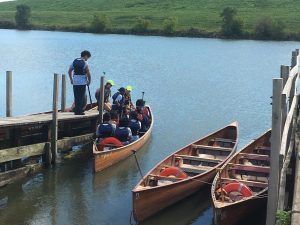Prairie Boat project docks along Little Calumet River in Beaubien Woods
By Ken Keenan for Chronicle Media — July 25, 2023
Beaubien Woods is part of the Forest Preserves of Cook County and comprises 300 acres of natural areas along the Little Calumet River. (Openlands photo)
Nature, history and community recently merged on the banks of the Little Calumet River with the unveiling of Prairie Boat, a newly constructed gathering space near the Beaubien Woods Boat Launch, located on the south side of Chicago.
Beaubien Woods is part of the Forest Preserves of Cook County and comprises 300 acres of natural areas along the Little Calumet River. The waterway flows west between Beaubien Woods, through the Chicago neighborhoods of Altgeld Gardens, Golden Gate, Riverside Village and Pangea Lakes, and onward toward the Village of Robbins.
The project was a collaborative effort involving the Field Museum, a community curatorial committee that the Field Museum convened, and the Forest Preserves of Cook County. These organizations took the lead in initiating, designing and coordinating the project. Openlands — an urban conservation program founded by the Welfare Council of Metropolitan Chicago — supported by funding the actual build-out of the space through a grant received from the Walder Foundation.
Prairie Boat was created by a group of artists who have a connection with the area. The project was inspired by the African American Heritage Water Trail and native landscapes, and the design was chosen by the Field Museum’s community curatorial committee.
“It’s a gathering space designed to be meaningful to the community, and to connect with the landscape,” said Openlands Water Trail Specialist Lillian Holden. “Gathering spaces are a form of community, and the residents in the area represent the demographic we’re looking for. The Little Calumet River has always been there, so the idea is to connect people to the local waterways … to have a place to commune and contribute to their quality of life.”
Holden said that Prairie Boat is one of the first gathering spaces of its kind on Cook County land.
“It’s the shape of a boat with artwork that references things like the Tuskegee Airmen, and paintings of enslaved people seeking freedom,” she said. “It also references the local landscape, so it’s a boat on a sea of prairie, as the area was always a prairie. It’s a place that welcomes you to the river.”
Being welcomed to the river has not always been the case for many area residents, as discrimination through the decades prevented those interested in fishing and boating from fully enjoying the experience. That’s where Openlands enters the picture.
“Access to boating and boating safety has always been a roadblock. Communities were being pushed out of the way,” Holden said. “Boaters who were facing discrimination, it’s deeply ingrained. We’ve been working since the 1990s to address that issue and create that access. We’re looking to amplify the boating community and to engage those who may be interested in taking it up. The community base is really into fishing as well. So, we want to push aside preconceived notions about being on the river.”
During its 60-year history, Openlands’ work has been centered on expanding access to nature across the Chicago metropolitan area. In 2019, Openlands and partners launched the African American Heritage Water Trail project to showcase and connect the waterway with stories of courage, resistance and Black history.
Holden said the genesis for Prairie Boat occurred when Openlands co-authored the Northeastern Illinois Regional Water Trail Plan with the Illinois Paddling Council and the Illinois Department of Natural Resources.
“Creating a paddling community feeds into some of our goals,” Holden said. “People can learn how to use the skills of paddling, and they can become waterway stewards and engage with river cleanup as well. It’s also an area rich in African American history and Native American history, too.”
The Heritage Water Trail covers approximately 180 years of African American history, including stories of people who settled along the river; freedom seekers traveling the Underground Railroad, trailblazers who defied discrimination en route to great achievements; and pioneers in the struggle for civil rights and environmental justice.
Holden cited several examples, such as Chicago’s Finest Marina, one of the first Black-owned marinas, created in the 1950s to provide a safe space along the river; the Ton Farm, a safehouse during the Antebellum era; and the work of Hazel Johnson, a community advocate for environmental justice in the area.
“She coined the term, ‘toxic donut’ to point out that governmental public housing was built in the center of steel mills and polluting industrialization,” Holden said. “The Trail talks about these sites and figures.”
Prairie Boat officially launched June 10, with a gala “grand reveal,” in partnership with the Forest Preserves of Cook County, the Field Museum, Far South Side Chicago Coalition and nearby Imani Village (an eco-friendly, mixed-use, “green” intergenerational community). The event included a ribbon-cutting ceremony, a poet from Trinity United Church of Christ and a local artist who talked about the creation of the site.
The event also provided a series of guided canoe rides, covering numerous aspects of the African American Heritage Water Trail’s aforementioned history along the way.
“We had at least 120 people participate in our launches,” Holden said. “It was a very successful event. People were very excited about it.”
Holden said she hopes the Prairie Boat gathering space becomes a go-to spot for anyone who wants to experience nature — on the river or in the general vicinity.
“We encourage people to come out and explore the river, but also to bring families to the Prairie Boat for gatherings,” she said. “You can learn about the history through the artwork, and spend a little time in nature as well. Beaubien Woods has a lot to offer — a lot of birds and other wildlife. It’s good to get out and enjoy nature … good for the soul.”
For more information, visit www.openlands.org.







